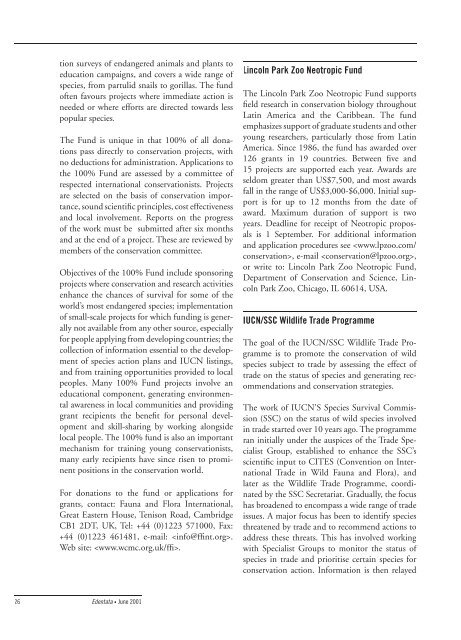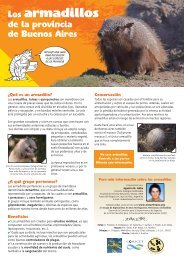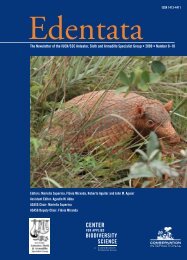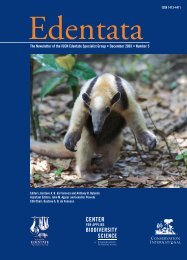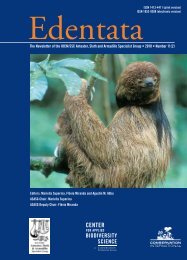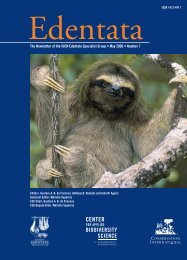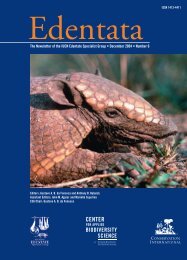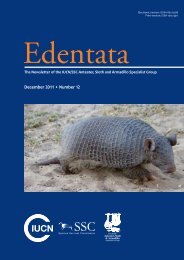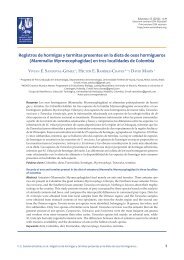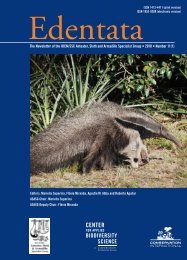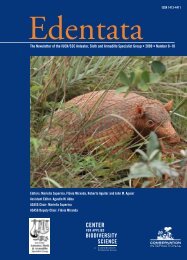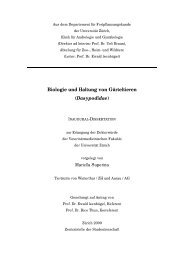Edentata 4 - Anteater, Sloth & Armadillo Specialist Group
Edentata 4 - Anteater, Sloth & Armadillo Specialist Group
Edentata 4 - Anteater, Sloth & Armadillo Specialist Group
You also want an ePaper? Increase the reach of your titles
YUMPU automatically turns print PDFs into web optimized ePapers that Google loves.
tion surveys of endangered animals and plants to<br />
education campaigns, and covers a wide range of<br />
species, from partulid snails to gorillas. The fund<br />
often favours projects where immediate action is<br />
needed or where efforts are directed towards less<br />
popular species.<br />
The Fund is unique in that 100% of all donations<br />
pass directly to conservation projects, with<br />
no deductions for administration. Applications to<br />
the 100% Fund are assessed by a committee of<br />
respected international conservationists. Projects<br />
are selected on the basis of conservation importance,<br />
sound scientific principles, cost effectiveness<br />
and local involvement. Reports on the progress<br />
of the work must be submitted after six months<br />
and at the end of a project. These are reviewed by<br />
members of the conservation committee.<br />
Objectives of the 100% Fund include sponsoring<br />
projects where conservation and research activities<br />
enhance the chances of survival for some of the<br />
world’s most endangered species; implementation<br />
of small-scale projects for which funding is generally<br />
not available from any other source, especially<br />
for people applying from developing countries; the<br />
collection of information essential to the development<br />
of species action plans and IUCN listings,<br />
and from training opportunities provided to local<br />
peoples. Many 100% Fund projects involve an<br />
educational component, generating environmental<br />
awareness in local communities and providing<br />
grant recipients the benefit for personal development<br />
and skill-sharing by working alongside<br />
local people. The 100% fund is also an important<br />
mechanism for training young conservationists,<br />
many early recipients have since risen to prominent<br />
positions in the conservation world.<br />
For donations to the fund or applications for<br />
grants, contact: Fauna and Flora International,<br />
Great Eastern House, Tenison Road, Cambridge<br />
CB1 2DT, UK, Tel: +44 (0)1223 571000, Fax:<br />
+44 (0)1223 461481, e-mail: .<br />
Web site: .<br />
Lincoln Park Zoo Neotropic Fund<br />
The Lincoln Park Zoo Neotropic Fund supports<br />
field research in conservation biology throughout<br />
Latin America and the Caribbean. The fund<br />
emphasizes support of graduate students and other<br />
young researchers, particularly those from Latin<br />
America. Since 1986, the fund has awarded over<br />
126 grants in 19 countries. Between five and<br />
15 projects are supported each year. Awards are<br />
seldom greater than US$7,500, and most awards<br />
fall in the range of US$3,000-$6,000. Initial support<br />
is for up to 12 months from the date of<br />
award. Maximum duration of support is two<br />
years. Deadline for receipt of Neotropic proposals<br />
is 1 September. For additional information<br />
and application procedures see , e-mail ,<br />
or write to: Lincoln Park Zoo Neotropic Fund,<br />
Department of Conservation and Science, Lincoln<br />
Park Zoo, Chicago, IL 60614, USA.<br />
IUCN/SSC Wildlife Trade Programme<br />
The goal of the IUCN/SSC Wildlife Trade Programme<br />
is to promote the conservation of wild<br />
species subject to trade by assessing the effect of<br />
trade on the status of species and generating recommendations<br />
and conservation strategies.<br />
The work of IUCN’S Species Survival Commission<br />
(SSC) on the status of wild species involved<br />
in trade started over 10 years ago. The programme<br />
ran initially under the auspices of the Trade <strong>Specialist</strong><br />
<strong>Group</strong>, established to enhance the SSC’s<br />
scientific input to CITES (Convention on International<br />
Trade in Wild Fauna and Flora), and<br />
later as the Wildlife Trade Programme, coordinated<br />
by the SSC Secretariat. Gradually, the focus<br />
has broadened to encompass a wide range of trade<br />
issues. A major focus has been to identify species<br />
threatened by trade and to recommend actions to<br />
address these threats. This has involved working<br />
with <strong>Specialist</strong> <strong>Group</strong>s to monitor the status of<br />
species in trade and prioritise certain species for<br />
conservation action. Information is then relayed<br />
26<br />
<strong>Edentata</strong> • June 2001


